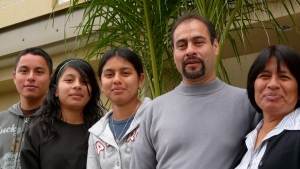Byline: Susan LaTempa
Here's a success story from the frontlines: how low-income community members can use their cellphones to advocate around issues that concern them. We get the details from California Partnership's Nancy Berlin.
In Southern California, like elsewhere in the world, cellphone access trumps computer access in marginalized communities. See the February 2010 New York Times editorial that notes "the United Nations says that right now 80 percent of the world's population has available cell coverage" and "the fastest adoption of cellphone use is occurring in some of the world's poorest places."
Nancy Berlin updated us about how CAP, for more than a year, has used a cellphone text-message alert combined with email alerts to coordinate individuals who want to participate in contacting elected officials to voice opinions on issues. So far, this doesn't sound like anything new, but the next several steps in the process are what caught our attention.
When folks sign up with CAP's "rapid response" team to receive alerts regarding, say, a piece of legislation, the alert's text-message not only names the issue but also includes a proprietary phone number.
"So if you get the text message," she explains, "You can call the number and a recorded message gives details about the issue and asks you do you want to speak to your senator or representative. Then it asks you for your zip code and it directs you directly to the representative. You don't have to remember to do it later; you don't have to have all these phone numbers. It's very helpful because people are all over the place."
Especially in L.A. Here's a way to contact your congressperson's office while you're waiting for the bus or watching your kids on the swings or taking a lunch break.
The email alert portion of the program makes similar use of mobile communications. Says Berlin, "You hit 'click to call' and enter your zip code and phone number and in 30 seconds your cell phone rings and it's the automated message with information about the issue and how to make the call."
But, says, Berlin, the technology by itself isn't enough. It took CAP organizers more than eight months and patient understanding of human psychology to achieve significant usage of the system by supporters. "Even those of us who are passionate about an issue, but it's not what we do for a living, when we think of calling, we feel a little afraid," she notes.
Because the program collects data quickly, organizers were immediately able to see that very few rapid responders were in fact responding. Says Berlin, "We were pretty dismayed and shocked." At first, CAP workers thought there was something wrong with the technology, but then they followed up with team members and realized that members needed further nudging to try the system and see how easy it was to speak their minds.
By monitoring the real-time number of calls put through to government representatives, organizers can mobilize follow-up efforts within hours. When CAP's rapid responders were further urged to go ahead and give the call-through system a try, organizers saw results. By last summer, there was an on-going participation rate of thousands of calls on a given day.
"Not only did we now know we were making a difference but it was also very energizing to be able to say to our members 'Look what we did!'" says Berlin.
The text messaging program described by Berlin was made available to CAP through the coalition Health Care For America Now and was built by Revolution Messaging a mobile communications and social media consulting firm based in Washington D.C. headed by Scott Goodstein, who was External Online Director for Obama for America.
Read previous posts about California Partnership>>
Return to Liberty Hill's website>>
Register on the site and become an agent of change>>




